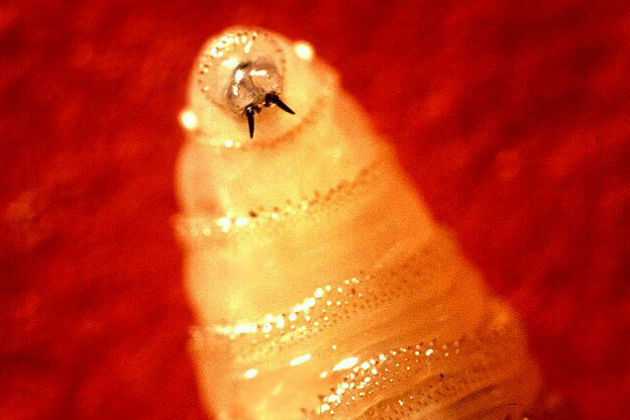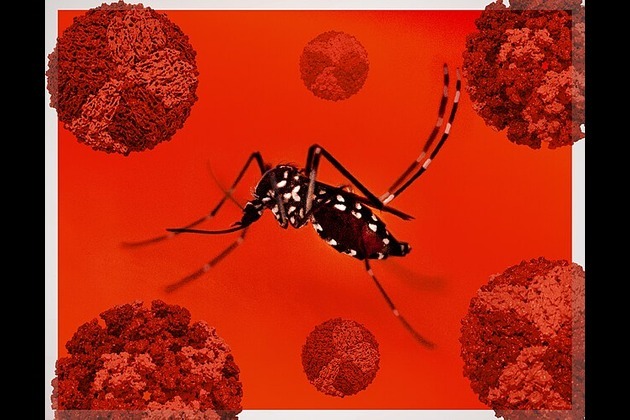Fly-breeding plan aims to halt flesh-eating screwworm threat
Mohan Sinha
24 Jul 2025, 08:57 GMT+10

- In a campaign that sounds more like a science fiction plot than public policy, the U.S. government is preparing to breed billions of sterile flies and release them from planes over Mexico and southern Texas
- The objective is to combat the deadly New World screwworm — a flesh-eating maggot that threatens to wreak havoc on livestock, wildlife, and even household pets
- The targeted pest, the larval form of the New World screwworm fly, feeds on the living tissue of warm-blooded animals
TOPEKA, Kansas: In a campaign that sounds more like a science fiction plot than public policy, the U.S. government is preparing to breed billions of sterile flies and release them from planes over Mexico and southern Texas. The objective? To combat the deadly New World screwworm — a flesh-eating maggot that threatens to wreak havoc on livestock, wildlife, and even household pets.
Though bizarre, this approach has proven effective in the past. The targeted pest, the larval form of the New World screwworm fly, feeds on the living tissue of warm-blooded animals. Female flies lay their eggs in open wounds or mucous membranes, and once hatched, the larvae burrow into flesh, causing severe pain, infection, and — if untreated — death. A single infestation can kill a 1,000-pound cow in under two weeks.
To halt the fly's spread, the U.S. Department of Agriculture (USDA) will release millions of sterile male flies into the wild. These flies, irradiated to prevent fertility, mate with wild females, but no offspring are produced. Over time, the pest population collapses.
"It's an exceptionally good technology," says Edwin Burgess, an entomologist at the University of Florida. "It's one of the great scientific solutions to a large-scale problem."
This method of biological pest control — called the Sterile Insect Technique — was instrumental in eradicating screwworms from the U.S. and much of Central America by the late 20th century. A fly production facility in Panama, jointly operated by the U.S. and regional partners, has served as the front line of defense, keeping the flies contained in South America.
But in late 2024, the screwworm reappeared in southern Mexico, triggering alarms. In response, the USDA plans to expand production by building a new fly factory in southern Mexico by July 2026. Meanwhile, a fly distribution center will open in Texas by the end of this year to receive sterile flies from Panama if needed.
Historically, from 1962 to 1975, over 94 billion sterile flies were released in North America to drive the screwworm to extinction. One biological advantage makes this tactic potent: female screwworm flies mate only once in their short adult lives. Ensuring that the majority of them pair with sterile males effectively halts the reproductive cycle.
Still, the risk is real and immediate. In May, the U.S. temporarily closed its southern border to live imports of cattle, horses, and bison. It may not reopen fully until September. The screwworm can infect any warm-blooded animal — including humans — and its return would be a devastating blow to the beef industry.
Decades ago, the U.S. maintained fly-breeding facilities in Florida and Texas, but those closed after the screwworm was declared eradicated. Now, the USDA wants to scale up again, targeting production of up to 400 million sterile flies per week. This effort will involve US$8.5 million for the Texas distribution hub and $21 million to convert an old fruit fly facility in Mexico.
Producing flies isn't as simple as it sounds. Females must be induced to lay eggs, and larvae need a nutritious diet. Past diets included mixtures of horse meat and honey, and later, blood plasma and egg powder. Once mature, the larvae — resembling dark brown Tic Tacs — are packed into sawdust trays to pupate.
Even logistics carries risk. Last month, a plane distributing flies near Mexico's Guatemala border crashed, killing three crew members. Air drops, typically conducted with light aircraft, still use variations of mid-century methods — either paper cups or crates dispensed through mechanical devices.
Experts warn that once the pest is again under control, the infrastructure should not be dismantled. "Declaring total victory is tempting," says Burgess, "but nature has a way of surprising us. A pest like this can always return."
 Share
Share
 Tweet
Tweet
 Share
Share
 Flip
Flip
 Email
Email
Watch latest videos
Subscribe and Follow
Get a daily dose of Africa Leader news through our daily email, its complimentary and keeps you fully up to date with world and business news as well.
News RELEASES
Publish news of your business, community or sports group, personnel appointments, major event and more by submitting a news release to Africa Leader.
More InformationInternational
SectionChikungunya outbreak hits Europe; WHO calls for swift response
GENEVA, Switzerland: Health authorities are facing a resurgence of the mosquito-borne chikungunya virus, with new outbreaks emerging...
BMA confirms five-day doctors’ strike as pay negotiations stall
LONDON, U.K.: Junior doctors in England will walk off the job this week after last-ditch talks with the government failed to resolve...
Iran refuses to abandon uranium enrichment after airstrikes
WASHINGTON, D.C.: Iranian Foreign Minister Abbas Araghchi has declared that Tehran will not abandon its uranium enrichment program,...
Over 170 injured as fighter jet hits Dhaka school campus
DHAKA, Bangladesh: At least 27 people have been killed and over 170 injured after a Bangladesh Air Force jet crashed into the campus...
Pools sold since 2002 recalled due to child drowning hazard
NEW YORK CITY, New York: A decades-long safety risk has triggered a significant recall of more than 5.2 million aboveground swimming...
Martin Luther King’s children urge caution as records go public
WASHINGTON, D.C.: The Trump administration has released over 240,000 pages of previously sealed FBI records detailing the government's...
Business
SectionU.S. stocks rally to close out week on positive note
NEW YORK, New York - U.S. stock markets made solid ground Friday, sending all the key indices out with weekly gains. The Standard and...
Trump announces 15% tariff on Japanese goods in new trade deal
WASHINGTON, D.C.: This week, President Donald Trump unveiled a new trade framework with Japan, announcing a 15 percent tariff on goods...
Amazon expands into AI wearables with Bee acquisition
SAN FRANCISCO, California: Amazon is making a fresh bet on artificial intelligence wearables by acquiring Bee, a San Francisco-based...
Japan auto tariff cut boosts shares; Seoul eyes similar deal
TOKYO/SEOUL: Japanese and South Korean automaker stocks rallied sharply on July 23 following news of a new U.S. trade agreement with...
Wall Street ends divided Thursday, Dow takes big hit
NEW YORK, New York - U.S. stocks were on the defensive Thursday. The Dow Jones index corrected its recent hefty gains, finishing with...
Survey shows credit access improved for auto loans, mortgages
NEW YORK CITY, New York: U.S. consumers found it easier to secure auto loans and refinance mortgages in June, according to new data...













